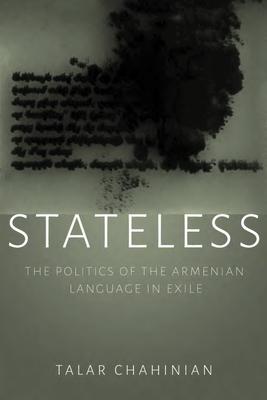In Stateless, Talar Chahinian offers a rich exploration of Western Armenian literary history in the wake of the 1915 genocide that led to the dispersion of Armenians across Europe, North America, the Middle East, and beyond. Chahinian highlights two specific time periods-post WW I Paris and Post WW II Beirut-to trace the ways in which literature developed in each diaspora. In Paris, a literary movement known as Menk addressed the horrors they experienced and focused on creating a new literary aesthetic centered on belonging while in exile. In Beirut, Chahinian shows how the literature was nationalized in the absence of state institutions. Armenian intellectuals constructed a unified and coherent narrative of the diaspora that returned to the pre-1915 literary tradition and excluded the Menk generation. Chahinian argues that the adoption of "national" as the literature's organizing logic ultimately limited its vitality and longevity as it ignored the diverse composition of diaspora communities.

In Stateless, Talar Chahinian offers a rich exploration of Western Armenian literary history in the wake of the 1915 genocide that led to the dispersion of Armenians across Europe, North America, the Middle East, and beyond. Chahinian highlights two specific time periods-post WW I Paris and Post WW II Beirut-to trace the ways in which literature developed in each diaspora. In Paris, a literary movement known as Menk addressed the horrors they experienced and focused on creating a new literary aesthetic centered on belonging while in exile. In Beirut, Chahinian shows how the literature was nationalized in the absence of state institutions. Armenian intellectuals constructed a unified and coherent narrative of the diaspora that returned to the pre-1915 literary tradition and excluded the Menk generation. Chahinian argues that the adoption of "national" as the literature's organizing logic ultimately limited its vitality and longevity as it ignored the diverse composition of diaspora communities.